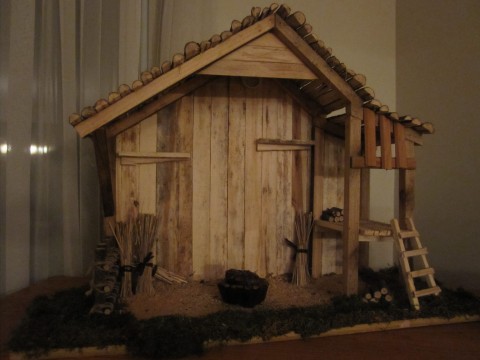When I was at the doctor’s office for a prenatal visit recently (something that is beginning to feel like a part-time job these days), I came across a diagram with two side-by-side images, one depicting the internal organs of a woman before pregnancy, and one with a child inside.
I was stunned to see the way the pregnant woman’s insides shifted and squished into odd pockets to accommodate her new resident. The bladder, I noted with special interest, was tucked underneath the baby and all but flattened. This explains so much!
I think about Mary and Joseph knocking on door after door in Bethlehem, looking for someplace that would accommodate them, only to hear over and over, “No room.” I wonder if Mary felt a twinge of irony at those words as she looked at her extravagant belly. You want to hear about no room? Please talk to my gallbladder!
But there’s a secret about hospitality—one that a woman great with child knows in an intimate way: There is never room. You have to say yes and trust that the space will grow to accommodate your guest.
True hospitality means you don’t wait until you have a bigger house, a bigger budget, a bigger heart. You don’t wait until you have more time, more margin, more furniture. You extend the invitation in faith, and trust that your space will expand, proportional to the need.
This Christmas, hospitality looks very different than it does most years. For most of us, there won’t be large gatherings, holiday parties, dinners with friends. So what does hospitality mean in the face of a pandemic and social distancing? Maybe, in reality, hospitality is smaller in scope than we think. Maybe it’s simply about making room within our crowded lives for someone who needs a little love.
This year, maybe hospitality looks like loving the people directly in your bubble. Maybe it means setting aside your crowded to-do list and making space to listen or play with Legos or whisper a prayer. Maybe it means expanding the borders of your heart to love someone who isn’t particularly lovable. Maybe it means saying yes to something you know is right before you’ve figured out exactly how to pull it off.
Maybe hospitality means saying yes before the space is there, before the energy is there, before the love is there . . . and trusting that God will make a space where there wasn’t any before.
Into this world, this demented inn in which there is absolutely no room for him at all, Christ comes uninvited.
Thomas Merton


 When you picture God, what come to mind? A stately King on his throne? A grandfatherly type with a beard? A disembodied being? It’s hard to picture God—and for good reason, since no one can look at his face and
When you picture God, what come to mind? A stately King on his throne? A grandfatherly type with a beard? A disembodied being? It’s hard to picture God—and for good reason, since no one can look at his face and 




